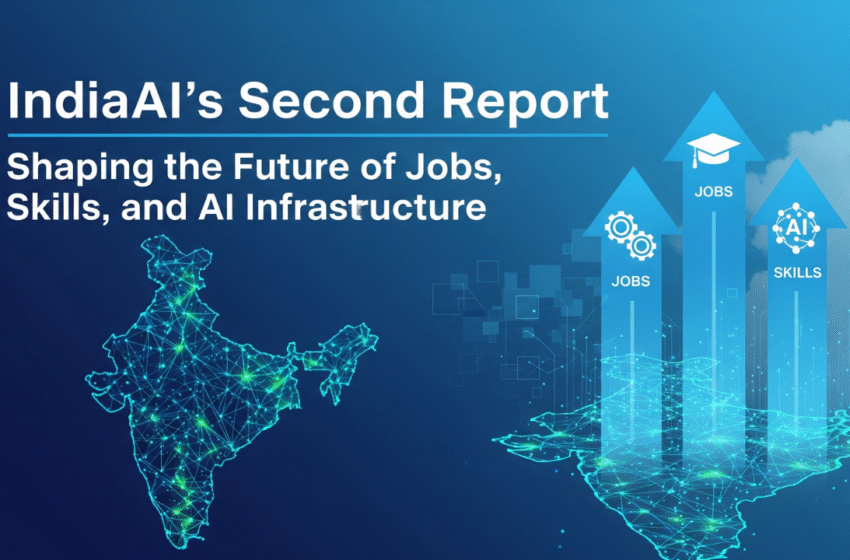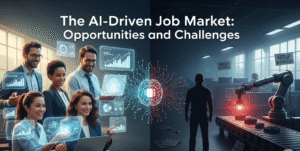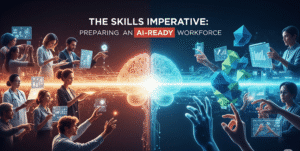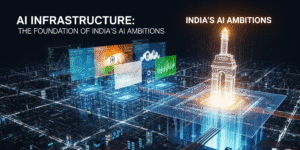WPL Auction 2026 : The Ultimate Guide to Women’s Premier League’s Big Day
AI Transformation : IndiaAI’s Second Report, Shaping the Future of Jobs, Skills, and AI Infrastructure

AI Transformation
AI Transformation : India is rapidly positioning itself as a global leader in artificial intelligence (AI), driven by its dynamic tech ecosystem, growing digital infrastructure, and forward-thinking government initiatives. The IndiaAI Mission’s second report highlights AI’s transformative impact on the job market, skill requirements, and infrastructure development. This blog dives into the report’s key insights, exploring how AI is reshaping employment, redefining skills, and strengthening India’s AI infrastructure to fuel innovation and economic growth.
The AI-Driven Job Market: Opportunities and Challenges
The IndiaAI Mission’s second report underscores AI’s dual role in India’s economy: creating new job opportunities while necessitating workforce adaptation to address automation-related challenges. AI is expected to significantly contribute to India’s economy, potentially adding $957 billion by 2035 and creating over 1 million AI-related jobs by 2026 across sectors like IT, healthcare, finance, and manufacturing.

Emerging Job Roles
AI Transformation is driving demand for specialized, high-skill roles that blend technical expertise with domain knowledge. Key roles include:
- AI Architects: Designing scalable AI systems for enterprise use.
- Machine Learning Engineers: Developing and deploying predictive models.
- AI Ethics Officers: Ensuring responsible and unbiased AI applications.
- Natural Language Processing (NLP) Specialists: Creating language models tailored to India’s multilingual landscape.
- AI Healthcare Consultants: Applying AI for diagnostics and personalized care.
The report notes a 46% year-on-year surge in demand for Machine Learning Engineers and a 23% increase for Full Stack AI Scientists, reflecting a shift toward specialized, interdisciplinary roles. AI is also enhancing productivity in sectors like finance and logistics, creating opportunities for professionals skilled in AI-driven data analysis and optimization.
Addressing Job Displacement
AI Transformation : While AI promises job creation, it also poses risks of job displacement, particularly in repetitive, low-skilled roles. Studies estimate that up to 30% of jobs in manufacturing, retail, and administrative sectors could be automated by 2030, with 24% of tasks across industries potentially fully automated. This could free up significant time for workers but requires a transition to new roles.
To counter this, the report emphasizes reskilling and upskilling to prepare the workforce for AI-driven roles. With 61% of Indian employees expressing concerns about automation—higher than the global average of 44%—there is an urgent need to align workforce capabilities with emerging demands.

The Skills Imperative: Preparing an AI-Ready Workforce
AI Transformation : The report highlights that technical expertise alone is not enough for success in the AI-driven economy. Alongside technical skills, soft skills like problem-solving, creativity, emotional intelligence, and interdisciplinary knowledge are increasingly critical for roles such as AI product managers and ethicists.
Strategies for Skill Development
To address the skills gap, the report outlines several strategies:
- Industry-Academia Partnerships: Collaborations to create AI-focused curricula that meet market demands, particularly in fields like semiconductors.
- Reskilling Programs: Large-scale initiatives to transition workers from declining roles to AI-driven ones, with 81% of Indian employers planning to support employees in adapting to AI technologies.
- Focus on Non-Metro Areas: Expanding AI education and training to Tier-2 and Tier-3 cities to access diverse talent pools.
- AI Ethics Training: Promoting responsible AI use to address ethical and regulatory challenges, especially as 44% of Indians rely on AI chatbots for news, raising concerns about misinformation.
- Inclusive Hiring Practices: 67% of Indian employers are adopting skills-based hiring, such as removing degree requirements, to tap into diverse talent.
India’s leadership in AI skill penetration, with tech talent three times more likely to report AI skills than in other countries, positions it as a global hub. However, scaling training programs to cover more than the current 100,000 workers annually is critical to meet future demand.

AI Infrastructure : The Foundation of India’s AI Ambitions
The IndiaAI Mission prioritizes robust AI infrastructure to support innovation and economic growth. Significant investments are being made to build compute capacity, data platforms, and digital ecosystems to drive AI development.
Key Infrastructure Initiatives
- Compute Capacity: The mission aims to address the projected need for 30,000 GPUs by 2027 to support AI model development and deployment.
- IndiaAI Datasets Platform: Set to launch in January 2025, this platform will provide access to public and private datasets to fuel AI innovation in sectors like healthcare, education, and agriculture.
- Digital Public Infrastructure (DPI): Systems like Aadhaar, UPI, and DigiLocker enable AI applications such as fraud detection and personalized services, leveraging India’s 700 million smartphone users and low data costs.
- Support for Startups: The mission supports India’s 10,000+ AI-focused startups, including platforms offering localized generative AI solutions in multiple Indian languages.
AI Transformation : Infrastructure Challenges
AI Transformation : Despite these efforts, challenges remain:
- Siloed Data: Large amounts of data from India’s DPI are underutilized or inaccessible, limiting AI model development.
- Overreliance on Government: The strategy heavily depends on public funding, which may constrain scalability without increased private-sector involvement.
- Compute Shortages: Meeting the demand for high-performance computing infrastructure requires significant investment and global partnerships.

A Vision for an AI-Powered India
The IndiaAI Mission’s second report paints an optimistic yet pragmatic picture of India’s AI future. By fostering job creation, prioritizing skill development, and investing in robust infrastructure, India is laying the groundwork to become a global AI powerhouse. However, addressing challenges like job displacement, skills gaps, and data accessibility will be critical to sustaining this momentum.
Also Read This : How to Repost Instagram Reels Effectively : A Comprehensive Guide
AI Transformation : As India embraces AI Transformation potential, collaboration between government, industry, and academia will be key to ensuring inclusive growth. By equipping its workforce with the right skills and building cutting-edge infrastructure, India can harness AI to drive economic prosperity and innovation for years to come.


